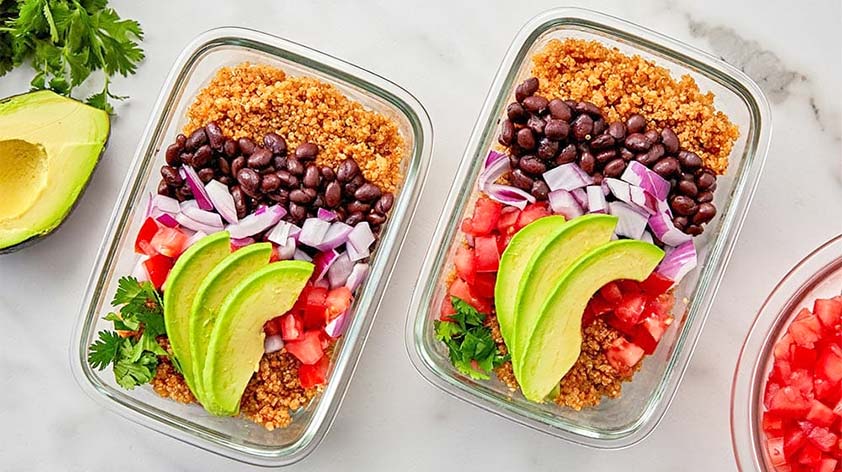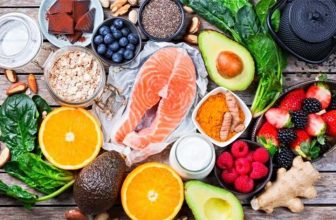
Habits are actions that require less effort and becomes more automatic the more they’re repeated, but until then, it requires focused attention and planning. According to one study1, habit formation can take between 18 and 254 days.
When I started university it was mandatory to enrol in an unlimited meal plan. Although it was nice to have meals cooked for me every day, often there wasn’t anything that I really wanted. The following year I had a kitchenette and was in a new environment, so what better time to start a new habit of eating healthier and learning to cook for myself. Follow on to learn about New Habits: 5 Things I Learned from Meal Prep as a Student!
1. Meal Prepping Helps You Eat Balanced Meals
Knowing what nutrients and how to incorporate them into your daily life can be daunting at first. If your goal is to eat healthier, why not buy a cookbook that focuses on healthy eating?
There are a lot of cookbooks available depending on whether you are looking for something more general or if you already have a goal in mind. Cookbooks are meant to help you feel like you don’t have to figure out everything on your own.
One of my favourites is The Family Immunity Cookbook by Toby Amidor. It focuses on immune-boosting foods and contains easy-to-follow recipes that tell you how the different elements are good for your health without requiring expensive equipment and knowledge of many cooking techniques.
Another tip is to purchase stackable containers that are freezer and microwave safe. They come in various sizes so you can buy whatever suits your needs and the types of meals you are preparing.
For example, for my dinners I use about eight containers that are roughly the same size, which are for the bulk of my meals, a couple small containers for sauces and toppings, and a couple of larger containers for storing baked goods. Dividing my meals into containers in advance ensures that my portion sizes remain consistent throughout the week so I’m not tempted to eat more than I should.
By getting into the habits of deciding what to eat, and preparing meals in advance I know that I will always have something healthy to get me through the week. Check out the video below for some suggestions on meal prep containers!
2. You Get to Learn a New Skill
If you don’t have much experience cooking on your own, it might be worth trying a meal delivery box. The box comes with a recipe, all the required ingredients measured out, and sometimes comes with veggies pre-chopped. This enables you to spend more time focusing on the cooking instructions without the added hassle of planning and shopping.
Once you’ve built the habits of making some meals on your own, you can start to expand your repertoire. Along the way, you learn which foods taste good as leftovers, what substitutions you can use, and what routine works for you.
I usually cook 2-3 dinners for the week and have recipe rotations so that I don’t eat the same meals too frequently. Check out the video below for some tips to improve your cooking!
3. Meal Prepping Saves Time
When I come home from a busy day, the last thing I want to do is go through the fridge and cupboards and think of something healthy to cook, and then actually cook it.
Meal prepping takes away the stress of having to think about what to cook every single day because you’ve already done the work in advance. When I first started meal prepping, I made the habit of planning my meals out on a whiteboard.
Rather than having to start from scratch every evening, meal prepping only takes a few minutes to heat your food back up. You also minimize the number of dishes that need to be washed every night.
One online resource that is great for those who are just starting to cook is called Cookspiration. It helps you organize your meals and you can choose recipes depending on your goal if you have one. It also creates a shopping list for you that you can download based on your recipes so it saves you time figuring out what you need.
4. Meal Prepping Saves Money & Waste
Being a university student, it gets expensive trying to cook different things each night, rather than having a few meals for the whole week.
Through turning meal prepping into a habit, I know what meals require similar ingredients so I can pair them in the same week, thus reducing the amount of waste. I also think about the amount of parchment and foil that would go to waste if I used it every day and have found that meal prepping minimises that. Check out the video above to see 24 tips for reducing your amount of wasted food!
5. Meal Prepping can be Turned into a Positive Association
When a friend and I first started living on our own, we decided to see each other once per week to meal prep. It was a way to ensure that we were eating healthy meals each week, but at the same time it was something to look forward to because we also used the time to socialise and check in on each other.
Before the pandemic we shopped together and it was a great way to save money because we could split bulk items. During the pandemic, cooking is something that you can also do online with your friends.
If you live by yourself, you can coordinate meal prepping with something that you like, for example habits of listening to your favourite podcasts, or music while you chop your veggies or having a TV show that you like playing in the background.
Cooking doesn’t have to feel like a chore. Through turning meal prepping into a habit and integrating it into your life, you can turn it into something to look forward to and something to share with others too! What are your best meal prep tips? Let us know in the comments below, and join in the conversation on Facebook, Twitter & Instagram!
Citations
1. Lally, P., Van Jaarsveld, C. H., Potts, H. W., & Wardle, J. (2010). How are habits formed: Modelling habit formation in the real world. European journal of social psychology, 40(6), 998-1009. https://doi.org/10.1002/ejsp.674









